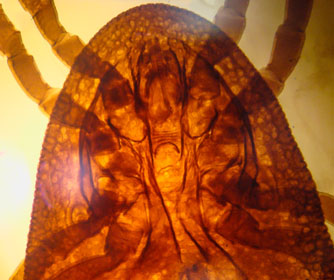UTSA professor Janakiram Seshu explores new method to stop the spread of Lyme disease

A close-up of a tick, one of the most common carriers of Lyme disease.

A close-up of a tick, one of the most common carriers of Lyme disease.
(May 9, 2016) -- Medication that is normally used to lower cholesterol could stop the spread of Lyme disease, according to a new study co-authored by Janakiram Seshu, associate professor of biology at The University of Texas at San Antonio (UTSA).
“Roughly 300,000 cases of Lyme disease are estimated to occur in the US by the Centers for Disease Control and Prevention every year,” Seshu said. “One of the questions we’re asking is how Lyme disease can be stopped before it’s transmitted from ticks to humans.”
Most cases of Lyme disease come from ticks that bite humans after they have acquired the agent of Lyme disease from infected animals, referred to as reservoir hosts. If the burden of infection is reduced in the reservoir hosts, it can be predicted that the chances for ticks to acquire the Lyme disease pathogen will be lower presumably leading to a reduction in the number of cases of human Lyme disease.
Seshu and his team have discovered that statins, medications usually used to lower cholesterol, can reduce the burden in mice and can therefore be exploited to reduce the number of Lyme disease bacteria acquired by the feeding ticks. These investigators believe that this could be one of the many strategies to lower the incidence of Lyme disease by restricting bacterial survival at its source.
“We’ve figured out that there’s one enzyme in the Lyme disease bacteria that is essential for creating its cell wall, which would allow the Lyme disease bacteria to live and cause infection,” he said. “We discovered that this enzyme can be inhibited by statins, which means that one class of drugs could reduce the number of infectious bacteria in the reservoir hosts.”
Seshu noted that these studies are based on experimental models of Lyme disease infection and more work needs to be done to determine how effective statins could be in blocking the natural life cycle of this pathogen.
While the use of statins doesn’t spell a complete elimination of Lyme disease, it has the potential to drastically reduce the number of new cases. Now Seshu and his UTSA graduate students are working to better understand how statins can be modified to primarily affect the survival of Lyme disease bacteria.
“First we want to determine how statins can be used to stop the growth of the pathogen and how we can exploit these findings to our benefit,” Seshu said. “Our hope is that if we reduce the number of viable organisms in infected reservoir hosts then we can block the transmission to a point that the disease doesn’t affect humans significantly in many areas of the US.”
-- Joanna Carver
Public Affairs Specialist
----------------------------
Read the full study, "Statins reduce spirochetal burden and modulate immune responses in the C3H/HeN mouse model of Lyme disease"
Learn more about Janakiram Seshu’s laboratory.
Learn more about the UTSA Department of Biology.
Connect online at Facebook, Twitter, YouTube, Instagram and UTSA Today.
Events
UTS Bold Careers hosts Student Technology Council where students have the opportunity to share feedback about technology needs to the UTS Leadership. The Leadership will also provide updates as to the technolgy projects for the campus.
Mesquite Room (SU 2.01.24,) Student Union, Main CampusJoin us for a hands-on workshop about the basics of copyright, both in education and as a researcher. We’ll dispel some common copyright myths, differences between copyright law and other intellectual property law, and teach you how to apply a Fair Use checklist to your scholarly work.
Virtual Event (Zoom)In this workshop, we will explore sentiment analysis, a method for identifying feelings in text, whether the tone is positive, negative, or neutral.
Group Spot B, John Peace LibraryLearn to use the simple but powerful features of EndNote®, a citation management tool. In this hands-on workshop, participants will learn to setup an EndNote library, save references and PDFs, and automatically create and edit a bibliography.
Virtual Event ( Zoom)The Urban Bird Project at UTSA will discuss urban bird populations, conservation efforts, and how you can get involved.
JPL Assembly Room (4.04.22,) Main CampusThe DMPTool is a free online resource that helps researchers create data management plans. This workshop will cover the main components of DMPs and how to create them using the DMPTool. Attendees will learn to: locate templates by funding agency, add research collaborators, and identify institutional guidance.
Virtual Event (Zoom)Join UTSA Libraries and Museums to learn more about the publishing discounts available for UTSA researchers. Current agreements include Elsevier, Cambridge University Press, Wiley, and more. Bring your questions and feedback for the library as we continue to pursue partnerships with publishers to reduce costs for our researchers.
Virtual Event (Zoom)

